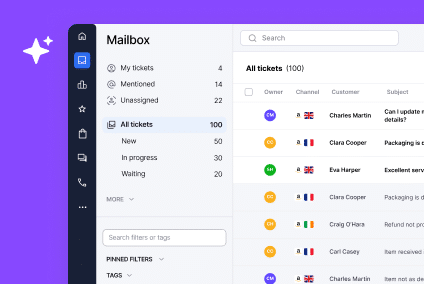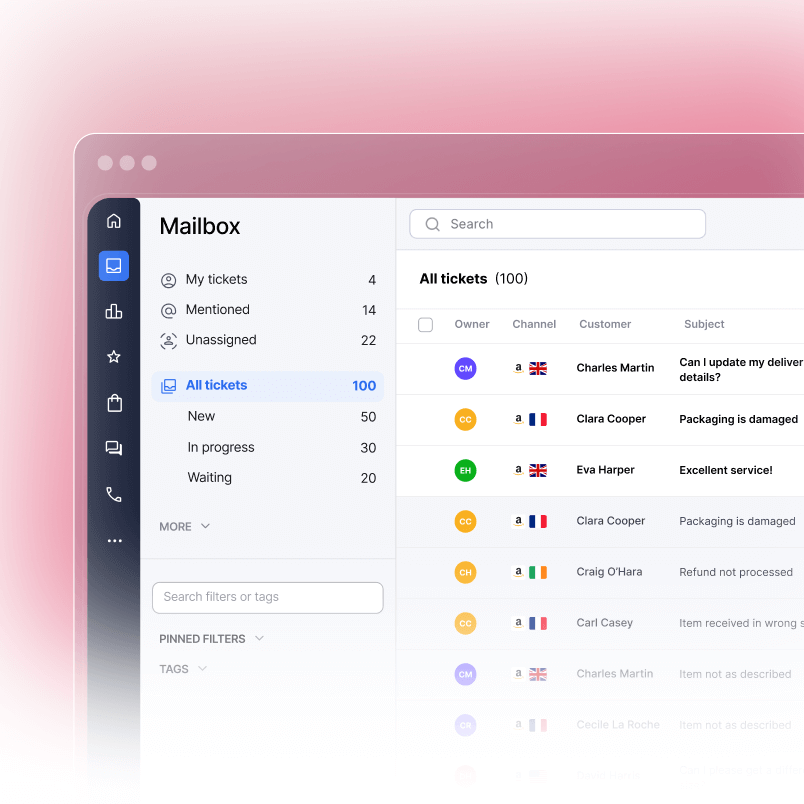When a customer reaches out about an order, the last thing your support team should be doing is asking “Can you provide your order number?” Multiple times. The best customer service software connects conversations directly to purchase history, giving agents instant context and enabling faster, more personalized responses.
For eCommerce businesses managing hundreds or thousands of orders across multiple channels, this capability isn’t just convenient, it’s essential. When support teams can see order details, shipping status, and product information right inside the conversation thread, resolution times drop and customer satisfaction soars.
This guide explores seven software solutions that excel at linking customer conversations to purchase history, with a focus on tools built specifically for eCommerce operations.
Why Linking Conversations to Purchase History Matters
Modern customers expect support teams to already know their history. They don’t want to repeat information or dig through old emails to find order numbers. When your support software automatically connects conversations to purchases, several things happen:
Faster Resolution Times: Agents spend less time searching for information and more time solving problems. Instead of toggling between systems, they see order details, product specifications, and shipping status in one unified view.
Enhanced Personalization: Context drives quality. When agents can see a customer’s full purchase history, they can tailor responses, recommend relevant products, and identify opportunities for upgrades or cross-sells.
Better Analytics: Linking support conversations to purchases reveals patterns. You can identify which products generate the most returns, which channels have the longest resolution times, and where customer friction occurs in your sales funnel.
Reduced Customer Effort: Customers appreciate not having to explain their situation multiple times. When agents have immediate access to order information, conversations feel smoother and more efficient.
For eCommerce businesses selling across marketplaces like Amazon, eBay, and Etsy, plus their own Shopify or WooCommerce stores, this integration becomes even more critical. You need software that can pull order data from multiple sources and present it in one coherent interface.
What to Look for in Conversation to Purchase Linkage Tools
Not all customer service platforms handle purchase integration equally. When evaluating software, prioritize these capabilities:
Real-Time Order Sync: The best tools connect directly to your sales channels and update order information in real time. Whether a customer messages you through Amazon, sends an email, or uses live chat, agents should see current order status, not outdated information.
Native Marketplace Integration: Third-party integrations often create delays or data gaps. Look for platforms with native connections to major marketplaces like Amazon, eBay, Walmart, and Etsy, plus eCommerce platforms like Shopify, WooCommerce, and BigCommerce.
Contextual Conversation History: Beyond seeing the current purchase, agents benefit from viewing the complete customer relationship, past orders, previous support tickets, and product preferences.
Omnichannel Support: Customers contact you through multiple channels: email, live chat, social media, marketplace messaging. Your software should consolidate all these conversations and link them to the relevant purchase records.
AI-Enhanced Insights: Modern platforms use AI to automatically match customers to purchases, suggest relevant help articles, predict issue types, and even draft response templates based on order context.
Flexible Filtering and Search: Agents need to quickly find orders by number, customer name, product SKU, or date range. Robust search and filtering capabilities save valuable time during high-volume periods.
Top 7 Tools That Link Conversations to Purchases
1. eDesk
Ideal For: Multichannel eCommerce businesses selling on marketplaces and webstores
eDesk was built specifically to solve the challenge of managing customer support across multiple sales channels while maintaining complete visibility into order history. Unlike general-purpose helpdesk tools that require complex integrations, eDesk natively connects to over 200 marketplaces and webstores, automatically linking every customer message to the relevant order.
Order History Integration: When a ticket arrives, eDesk automatically retrieves complete order details including product information, shipping status, customer purchase history, and tracking numbers. Agents see everything in a single, unified ticket view, eliminating the need to switch between systems or ask customers for order numbers.
Channels Supported: Amazon, eBay, Etsy, Walmart, Shopify, WooCommerce, Magento, BigCommerce, TikTok Shop, plus email, live chat, social media, and phone.
AI and Automation Features: eDesk’s AI capabilities include automatic ticket categorization, sentiment analysis, smart assignment rules, and pre-built response templates that adapt to order context. The platform also offers Smart Inbox prioritization, which surfaces urgent tickets based on order value and customer history.
Pricing: Plans start with a free trial available at https://dashboard.edesk.com/register/edesk/new. Custom pricing based on ticket volume and channels.
Notable Strengths: eDesk stands out for its deep marketplace integrations and purpose-built design for eCommerce operations. The platform handles feedback and reviews alongside support tickets, giving teams a complete picture of customer sentiment. Performance analytics show resolution times, customer satisfaction scores, and agent productivity metrics, all connected to actual sales data.
2. Zendesk
Ideal For: Enterprise businesses with dedicated development resources for custom integrations
Zendesk offers a comprehensive support platform with extensive integration capabilities through its App Marketplace. While not built specifically for eCommerce, Zendesk can connect to order databases through third-party apps and custom API integrations.
Order History Integration: Purchase data integration requires setup through Zendesk apps or custom development. Once configured, agents can view order information in a sidebar widget while managing tickets. The level of integration depth depends on the apps used and customization efforts.
Channels Supported: Email, live chat, phone, social media, messaging apps, and self-service portals.
AI and Automation Features: Zendesk offers robust AI capabilities including Answer Bot for automated responses, intelligent ticket routing, sentiment analysis, and advanced analytics. The platform’s AI learns from historical tickets to improve suggestions over time.
Pricing: Plans start at $19 per agent per month for the Suite Team plan. Enterprise plans with advanced features require custom quotes.
Notable Strengths: Zendesk excels in scalability and customization options. Large enterprises with complex requirements can build highly tailored workflows. The platform’s reporting and analytics capabilities are among the most sophisticated in the industry.
3. Freshdesk
URL: https://www.freshdesk.com/
Ideal For: Small to medium businesses seeking affordable helpdesk software with basic eCommerce integration
Freshdesk provides a user-friendly support platform with marketplace integrations available through its app ecosystem. While less specialized for eCommerce than dedicated platforms, Freshdesk offers solid foundational features at competitive prices.
Order History Integration: eCommerce integrations connect through Freshdesk’s marketplace apps. Agents can access order information through sidebar apps that pull data from Shopify, WooCommerce, and other platforms. The integration depth varies by app.
Channels Supported: Email, phone, chat, social media, and messaging platforms.
AI and Automation Features: Freshdesk includes Freddy AI for chatbots, ticket assignment, and response suggestions. Automation rules handle repetitive tasks like ticket categorization and escalation.
Pricing: Free plan available for up to 10 agents. Paid plans start at $15 per agent per month.
Notable Strengths: Freshdesk offers excellent value for small teams just starting with helpdesk software. The interface is intuitive, onboarding is straightforward, and the free tier provides genuine utility for micro businesses.
4. Richpanel
URL: https://www.richpanel.com/
Ideal For: Shopify stores prioritizing self-service and customer portals
Richpanel focuses specifically on eCommerce support with strong emphasis on customer self-service capabilities. The platform connects directly to Shopify and other eCommerce platforms to display order information within support conversations.
Order History Integration: Native Shopify integration automatically pulls order details, subscription information, and customer profiles into the helpdesk. Agents can view complete purchase history, modify orders, process refunds, and update shipping addresses without leaving the ticket view.
Channels Supported: Email, live chat, Facebook Messenger, Instagram, WhatsApp, and SMS.
AI and Automation Features: Richpanel emphasizes automation through self-service portals where customers can track orders, initiate returns, and modify subscriptions. The platform includes chatbot capabilities and automated workflows for common issues.
Pricing: Plans start at $29 per month for 100 tickets. Higher tiers scale based on ticket volume and feature access.
Notable Strengths: The self-service portal significantly reduces ticket volume by enabling customers to handle routine tasks independently. For Shopify merchants, the tight integration makes order management seamless.
5. Zoho Desk
URL: https://www.zoho.com/desk/
Ideal For: Businesses already using Zoho ecosystem products
Zoho Desk integrates smoothly with other Zoho applications like Zoho CRM, creating a unified customer data platform. eCommerce integrations connect through Zoho Marketplace extensions.
Order History Integration: Purchase data integration works through Zoho CRM or marketplace apps that connect to eCommerce platforms. Once set up, agents see customer purchase history, open orders, and product preferences alongside support tickets.
Channels Supported: Email, phone, live chat, social media, and help center.
AI and Automation Features: Zia, Zoho’s AI assistant, handles ticket categorization, sentiment analysis, response suggestions, and anomaly detection in ticket trends. Blueprint automation creates guided workflows for complex support processes.
Pricing: Free plan for up to three agents. Paid plans start at $14 per agent per month.
Notable Strengths: For businesses invested in the Zoho ecosystem, Desk provides seamless integration with CRM, marketing, and accounting tools. The platform offers strong customization options and competitive pricing.
6. HubSpot Service Hub
URL: https://www.hubspot.com/products/service
Ideal For: Businesses prioritizing unified CRM, marketing, and support data
HubSpot Service Hub connects customer service directly to the HubSpot CRM, creating a complete view of customer interactions across marketing, sales, and support touchpoints. eCommerce integration happens through HubSpot’s App Marketplace.
Order History Integration: Purchase information flows into HubSpot CRM through eCommerce platform integrations. Agents accessing tickets see the customer’s complete timeline including website visits, email interactions, purchases, and previous support conversations.
Channels Supported: Email, live chat, phone, Facebook Messenger, and help center.
AI and Automation Features: HubSpot uses AI for conversation routing, chatbot responses, and customer sentiment tracking. Workflows automate ticket assignment, follow-up sequences, and internal notifications based on customer behavior.
Pricing: Free tools available with limited features. Starter plan begins at $15 per month. Professional and Enterprise tiers offer advanced capabilities with custom pricing.
Notable Strengths: The unified platform approach means marketing, sales, and support teams all work from the same customer data. This integration proves valuable for businesses focused on holistic customer experience management.
7. Kustomer
URL: https://www.kustomer.com/
Ideal For: Mid-market and enterprise brands seeking modern, timeline-based support
Kustomer differentiates itself with a customer-focused interface that organizes all interactions in a unified timeline. Rather than treating each conversation as an isolated ticket, Kustomer presents the complete customer relationship chronologically.
Order History Integration: The platform connects to eCommerce systems through native integrations and APIs, displaying purchase history, order status, and product details within the customer timeline. Agents see orders alongside conversations, creating complete context for every interaction.
Channels Supported: Email, chat, SMS, social media, phone, and messaging apps.
AI and Automation Features: KustomerIQ provides AI-powered insights including intent detection, suggested responses, and automated workflows. The platform can route conversations based on customer value, issue type, and agent expertise.
Pricing: Custom pricing based on business size and requirements. Enterprise-focused with corresponding price points.
Notable Strengths: The timeline view provides intuitive context that helps agents understand customer relationships at a glance. Strong for brands with high customer lifetime value who prioritize relationship building over transactional support.
Feature Comparison Table
| Tool | Order Integration | AI Capabilities | Channels Supported | Best For |
| eDesk | Native integration with 200+ marketplaces and webstores | Auto-categorization, sentiment analysis, smart prioritization | Amazon, eBay, Shopify, social, email, chat, phone | Multichannel eCommerce businesses |
| Zendesk | Third-party apps and custom APIs | Answer Bot, intelligent routing, advanced analytics | Email, chat, phone, social, messaging | Enterprise with custom integration needs |
| Freshdesk | Marketplace apps for major platforms | Freddy AI, chatbots, automation rules | Email, phone, chat, social | Small to medium businesses |
| Richpanel | Native Shopify and eCommerce integrations | Self-service automation, chatbots | Email, chat, social messaging | Shopify stores emphasizing self-service |
| Zoho Desk | Zoho CRM and marketplace extensions | Zia AI, Blueprint workflows | Email, phone, chat, social | Zoho ecosystem users |
| HubSpot Service Hub | HubSpot CRM and marketplace apps | Conversation routing, sentiment tracking | Email, chat, phone, social | Businesses wanting unified CRM and support |
| Kustomer | Native integrations and API connections | KustomerIQ, intent detection, smart routing | Email, chat, SMS, social, phone | Brands focused on customer relationships |
Benefits of Linking Support to Purchase History
Connecting customer conversations to purchase data transforms support from reactive problem-solving to proactive relationship management. The benefits extend beyond faster ticket resolution.
Context-Rich Tickets Reduce Resolution Time: When agents immediately see what the customer ordered, when it shipped, and any previous support history, they can diagnose issues faster. A customer asking “Where’s my order?” gets an instant answer when the agent sees the tracking number and delivery status right in the ticket. No need to ask for order numbers, no searching through multiple systems.
Personalization Drives Customer Satisfaction: Support conversations feel more personal when agents reference past purchases and understand customer preferences. “I see you bought the blue model last time, would you like the same color for this replacement?” demonstrates attentiveness that generic responses cannot match.
Reduced Ticket Handling Time Lowers Costs: Every minute spent searching for information is a minute not spent helping customers. When order data appears automatically, average handling time drops significantly. For high-volume eCommerce operations, this efficiency gain translates directly to cost savings and increased capacity.
Analytics Reveal Product and Process Issues: Linking conversations to purchases enables sophisticated analysis. Which products generate the most returns? Which shipping carriers cause the most complaints? What issues lead to chargebacks? These insights drive operational improvements that reduce future support volume.
Upsell and Cross-Sell Opportunities Become Visible: Support interactions offer natural opportunities for additional sales. When an agent sees a customer regularly orders the same consumable product, they can suggest a subscription. When a customer needs a replacement part, they can recommend an upgraded model. Context makes these suggestions relevant rather than pushy.
Customer Lifetime Value Calculation Improves Prioritization: Not all customers require equal attention. High-value customers experiencing issues deserve expedited handling. When support software shows purchase history and total spend, agents can appropriately prioritize their queue and provide VIP treatment to top customers.
Use Cases Across Industries
Different business models benefit from conversation to purchase linking in unique ways.
eCommerce Retailers: Online sellers deal constantly with order-related inquiries: shipping delays, size questions, return requests, product defects. Having order information immediately available means agents can process returns, send replacement tracking numbers, or escalate shipping issues without asking customers to provide details they’ve already given.
An electronics retailer using eDesk, for example, can instantly see whether a customer’s warranty is still valid, what accessories they purchased with the original item, and whether they’ve returned products before. This context informs how the agent handles a defect claim.
Subscription Services: Companies offering recurring deliveries or software subscriptions need clear visibility into subscription status, billing history, and usage patterns. When a customer contacts support, agents should immediately see whether they’re on a monthly or annual plan, when the next renewal occurs, and what features they’re currently using.
This context helps agents provide accurate information about upgrades, handle billing disputes with complete transaction history, and identify opportunities to prevent churn by offering retention incentives to at-risk customers.
Marketplace Sellers: Businesses selling on Amazon, eBay, and other marketplaces juggle support conversations from multiple channels, each with different messaging systems and order formats. Software that consolidates these conversations and normalizes order data across platforms prevents agents from learning multiple systems and reduces errors.
A seller receiving a message through Amazon can see that the same customer also purchased from their eBay store last month, enabling them to recognize repeat customers and provide consistent service regardless of channel.
B2B Distributors: Business customers often place large, complex orders with multiple line items and specific delivery requirements. When a procurement manager contacts support about a shipment, agents need to quickly access the purchase order, verify item specifications, and coordinate with logistics.
Purchase history integration helps identify patterns in business customer needs, enabling proactive suggestions for bulk reorders and contract renewals.
Fashion and Apparel Brands: Clothing retailers deal with frequent size and fit questions. When customers contact support about sizing, agents who can see previous purchase history can say “You ordered a medium in this brand before, so I’d recommend sticking with medium for this style too.” This personalized guidance reduces returns and improves satisfaction.
Want to see how conversation to purchase linking works for your specific business model? Book a demo with eDesk to explore your use case.
Frequently Asked Questions (FAQs)
How does eDesk link support tickets to orders?
eDesk automatically matches incoming customer messages to relevant orders using multiple data points including customer email address, marketplace buyer ID, and order numbers mentioned in messages. When a ticket arrives from Amazon, eBay, or any connected channel, eDesk retrieves the complete order history for that customer and displays it directly in the ticket view. Agents see product details, shipping status, tracking numbers, and previous support conversations without switching systems.
Can I connect Amazon orders to support conversations?
Yes, most modern support platforms can integrate with Amazon, though the depth of integration varies. eDesk offers native Amazon integration that automatically pulls order details, customer information, and message history from Amazon Seller Central. This eliminates manual lookups and ensures agents have complete context. Other platforms may require third-party apps or custom API development to achieve similar functionality.
Do these tools integrate with WooCommerce and TikTok Shop?
Integration support varies by platform. eDesk natively integrates with both WooCommerce and TikTok Shop, automatically syncing order data and customer messages. Zendesk and Freshdesk support WooCommerce through marketplace apps, though TikTok Shop integration may be limited. When evaluating software, verify that your specific sales channels are supported with the depth of integration you need.
Is AI used to automatically match customers and purchases?
Modern support platforms increasingly use AI to match conversations with purchase records. This matching happens through algorithms that compare customer identifiers like email addresses, phone numbers, and marketplace user IDs against order databases. AI also helps by analyzing message content to identify order numbers, product names, and issue types, then surfacing relevant order information to agents. eDesk, Zendesk, and Kustomer all employ AI matching to varying degrees.
What happens if a customer contacts us about an order from a different sales channel?
Platforms with multi-channel integration can display orders from all connected channels in a unified view. If a customer emails you about an Amazon order but previously purchased from your Shopify store, software like eDesk shows both order histories in the same ticket. This cross-channel visibility helps agents provide consistent service and recognize valuable repeat customers regardless of where they shop.
Can agents modify orders directly from the support interface?
Some platforms allow order modifications directly within tickets, while others require switching to your eCommerce admin panel. Richpanel and eDesk both offer capabilities to process refunds, update shipping addresses, and modify order details without leaving the support interface. This functionality speeds resolution for common requests like address changes and cancellations.
Choosing the Right Tool for Your Business
Selecting software that connects customer conversations to purchase history requires evaluating your specific operational needs, sales channels, and growth plans.
For multichannel eCommerce businesses selling across marketplaces and webstores, purpose-built platforms like eDesk offer the deepest integration and most streamlined workflows. The native connections to hundreds of channels eliminate integration complexity and ensure reliable order data sync.
Enterprises with complex requirements and dedicated technical resources may prefer platforms like Zendesk or Kustomer that offer extensive customization through APIs and app ecosystems. These platforms excel when you need to build highly specific workflows or integrate with proprietary systems.
Small businesses just starting with customer service software should consider cost-effective options like Freshdesk or Zoho Desk that provide core functionality without overwhelming complexity. As your operation grows, you can migrate to more specialized platforms.
Shopify-focused stores benefit from tools like Richpanel that offer deep integration with the Shopify ecosystem and emphasize customer self-service capabilities that reduce ticket volume.
Businesses prioritizing unified marketing, sales, and support data find value in HubSpot Service Hub’s CRM-centric approach that connects every customer touchpoint in one platform.
Regardless of which platform you choose, the core requirement remains consistent: your support team needs immediate access to order information within the conversation context. Without this connection, agents waste time searching, customers repeat information, and resolution times suffer.
Ready to experience how automated conversation to purchase linking transforms eCommerce support? Start your free trial with eDesk and see the difference that purpose-built eCommerce support software makes.




